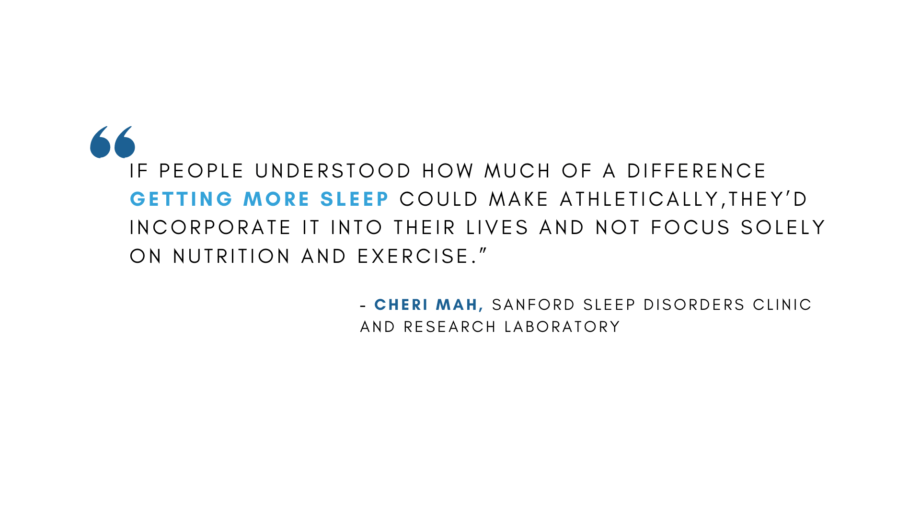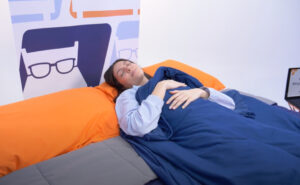Restorative Sleep for Muscle Recovery
Disclosure: By clicking on the product links in this article, Mattress Nerd may receive a commission fee at no cost to you, the reader. Read full disclosure statement.
Sleep plays a vital role in our overall health, and it is especially critical for athletes and people who are highly active and strength train regularly. During sleep, our body goes into recovery mode, releasing hormones and other chemicals that repair and restore muscle. A good night’s sleep gives you both the rest and recuperation your body needs to perform well, whether you are an elite athlete or exercise enthusiast. So, exactly how does this process work? Read on and we’ll explain.
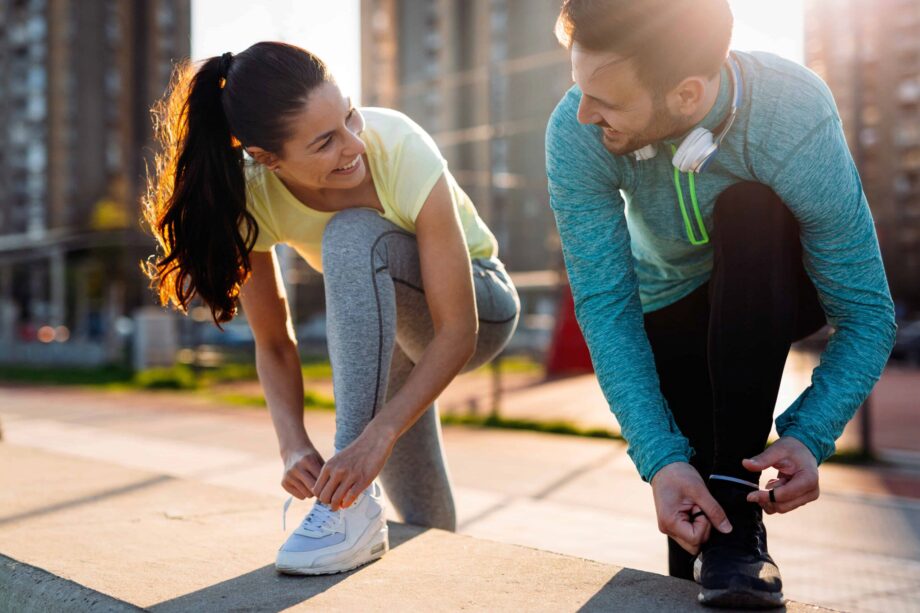
Do You Build Muscle While You Sleep?
The short answer is yes. But none of us just wake up with killer muscles — the process is a bit more complicated. To fully grasp it we first need to understand how sleep works.
Understanding Sleep
There are two different types of sleep:
- REM (rapid eye movement)
- Non-REM
Each night, you cycle through these stages several times with increasingly more extended periods of REM.
REM Sleep
During REM sleep, we dream. Our muscles relax and are relieved of tension and are temporarily paralyzed to prevent us from acting out our dreams.
REM sleep occurs after three stages of non-REM sleep, also known as slow-wave or deep sleep. It’s during this time that the body works to restore itself. Our blood pressure drops, our breathing slows and deepens, and our brains relax. Blood supply to the muscles also increases feeding muscles with oxygen and nutrients.
Non-REM Sleep
During non-REM sleep, the pituitary gland in our brains secretes a hearty dose of human growth hormone (HGH), which goes to work stimulating tissue growth and muscle repair.
How Lack of Sleep Impacts Your Muscles
Sleep & Muscle Function
Sleep sharpens the coordination and function of our muscles and muscle movement patterns, and thus improves athletic performance. Stanford University researchers recently put this theory to the test, recruiting elite NCAA men’s and women’s swimming teams.
For the first two weeks of the study, students maintained their usual sleep-wake schedules. In the next phase of the study, swimmers extended their sleep to 10 hours a night. After each swim practice, their athletic performance was assessed. At the end of the study, researchers found that with the extra sleep swimmers, on average, swam faster, reacted quicker off the blocks, improved turn times, and added five additional kicks.
When the researchers tried the same study on varsity basketball players, they saw similar results — players who slept at least 10 hours at night ran faster and made more shots.
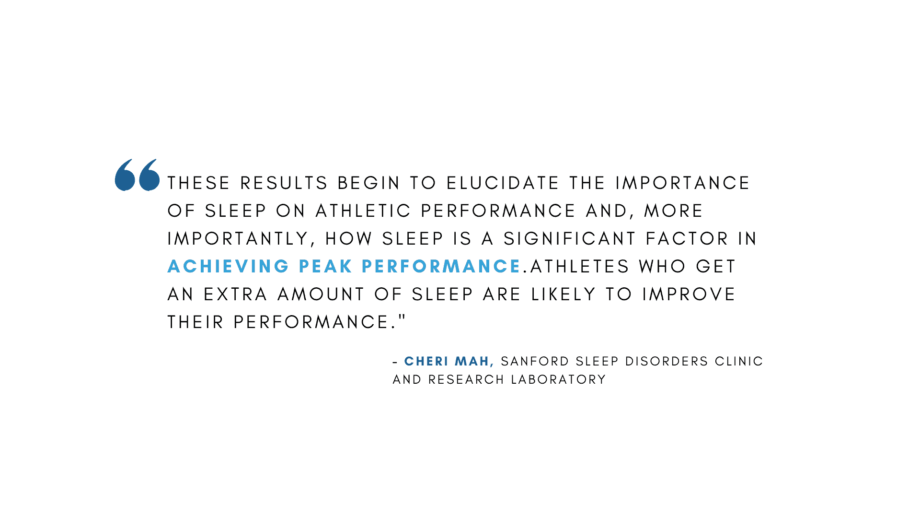
Sleep & Muscle Recovery
What Happens to Our Muscles When We Work Out:
- During strenuous exercise, micro-damage within the muscle tissue occurs, as does damage to the complex protein chains within the muscles.
- Chemicals called “reactive oxygen species” rush to these areas of damage and cause even more damage. (Don’t worry. This is how muscles strengthen and grow.)
- The chemicals trigger a natural inflammatory response to the damage, which you may feel as soreness.
- The natural inflammatory response prompts the brain to repair muscle damage.
- The response also creates growth factors to form new muscle fibers and replace damaged proteins.
- Over time, this process creates an increase in muscle strength and mass.
How Does Sleep Impact Muscle Recovery?
- Sleep plays a vital role in this recovery process because that’s when the body releases up to 95% percent of its growth hormone to repair and restore muscle.
- When we sleep, our bodies also replenish muscle glycogen, a critical energy source that depletes when you exercise.
According to a study published in the Journal of the American Medical Association, the more a person experiences deep sleep, the more Human Growth Hormone is released. However, if you don’t get sufficient sleep, you don’t receive as much growth hormone secretion. According to a study published in the Journal Medical Hypotheses, a deficiency of this critical hormone is linked to loss of muscle mass and reduced exercise capacity.
How to Optimize Muscle Recovery While You Sleep
- Get at least 8-10 hours of sleep each night. As previously stated, the more sleep, the more human growth hormone is secreted to repair and nourish your muscles.
- Consume protein 30 minutes before bedtime. Studies show that resistance-trained athletes who did so increased the availability of amino acids throughout sleep, increasing strength and muscle size.
- Create a bedtime routine about 30 minutes before bedtime to wind down your body and mind. Unplug the devices and take a shower, read a book, or listen to soothing music.
- Set a regular bedtime. This creates a set time for the brain’s release of melatonin, the sleep hormone, to help you fall asleep.
- Don’t exercise too close to bedtime. Exercise promotes adrenaline release, keeping your mind and body alert rather than allowing you to wind down so you can sleep.
- Invest in a new mattress. A study published in Applied Ergonomics found that a new mattress can help people sleep better, and those who got seven to eight hours of sleep at night on a new mattress were more likely to participate in physical activity.
- Get comfortable. Sometimes your sleeping position can cause aches and pains. For example, the American Chiropractic Association recommends sleeping on your side or back, and using pillows, if needed, for added comfort, such as between the knees to keep the spine aligned or lower back for lumbar support. Stomach sleeping is not recommended because it causes strain on the lower back.
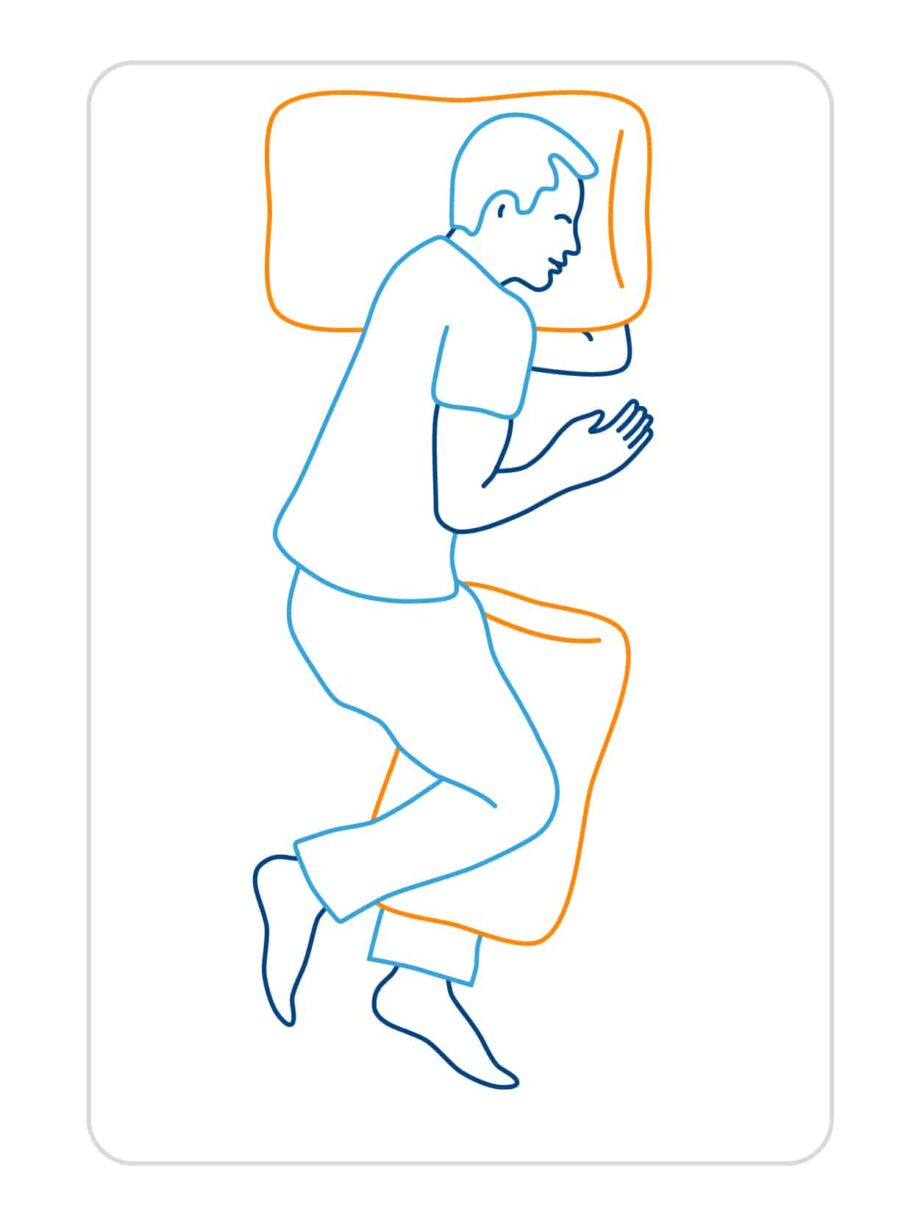
Side Sleeping Position
Place your head on a firm pillow with your face straight ahead. Bend your knees with a pillow in between your legs to keep your spine aligned with your knees pointing away from your chest.
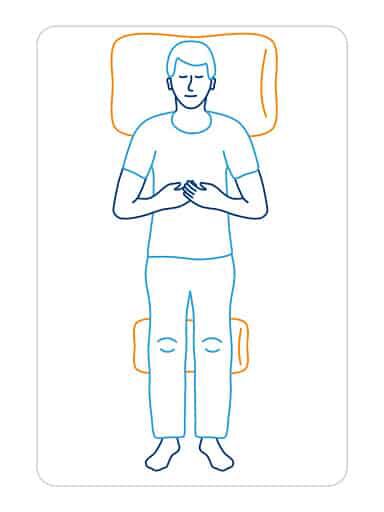
Back Sleeping Position
Place your head straight onto your pillow, keeping the neck long. Use a pillow under your knees to keep your back in a neutral position.
How To Get Better Sleep When Your Muscles Are Sore
Strenuous exercise causes damage to the muscles; this triggers an immune response that can cause muscle inflammation resulting in sore muscles. Here are some ways you can ease muscle soreness and get a good night’s sleep:
- Try easy movement: Sitting still after a workout can stiffen your muscles and make your muscle soreness worse. Gentle activity after a workout, like walking, increases circulation and improves blood flow to the muscles. This, in turn, speeds up the repair process.
- Hydrate: Dehydration can increase muscle soreness. Drinking plenty of water can keep you hydrated and help flush out waste products released when muscles break down.
- Heat or ice: Heat increases blood flow to your muscles to reduce tension and pain. Ice reduces swelling.
- OTC nonsteroidal anti-inflammatory drugs, or NSAIDs, such as ibuprofen (Advil), can help reduce inflammation and the pain associated with it.
- Try a mattress infused with copper: Some foam bed mattresses are infused with copper. Copper is known to help reduce joint inflammation and provide relief from joint pain and stiffness.
- Stretch, but gently: Stretching doesn’t help repair the damage to the muscles that exercise causes, but it can help you feel better.
If you are looking for some targeted relief, here some great stretches to try:
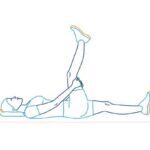
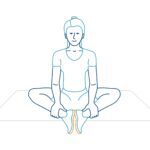
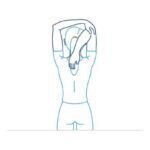
How Nutrition Plays a Role in Sleep & Muscle Recovery
Nutrition is an important part of an athlete’s training plan. But it also plays a vital role in our quality of sleep. When you exercise, your muscles use up stored glucose, called glycogen.
Getting a healthy dose of proteins, carbohydrates, and healthy fats after your workout can replenish glycogen supply and help speed repair of muscles.
Adequate protein and resistance training is so important for maintaining and building healthy muscle mass. Be sure to spread your intake of protein throughout the day. Make sure breakfast, lunch, and dinner all contain a good source of protein.” – Katie Dodd, Board Certified Specialist in Gerontological Nutrition
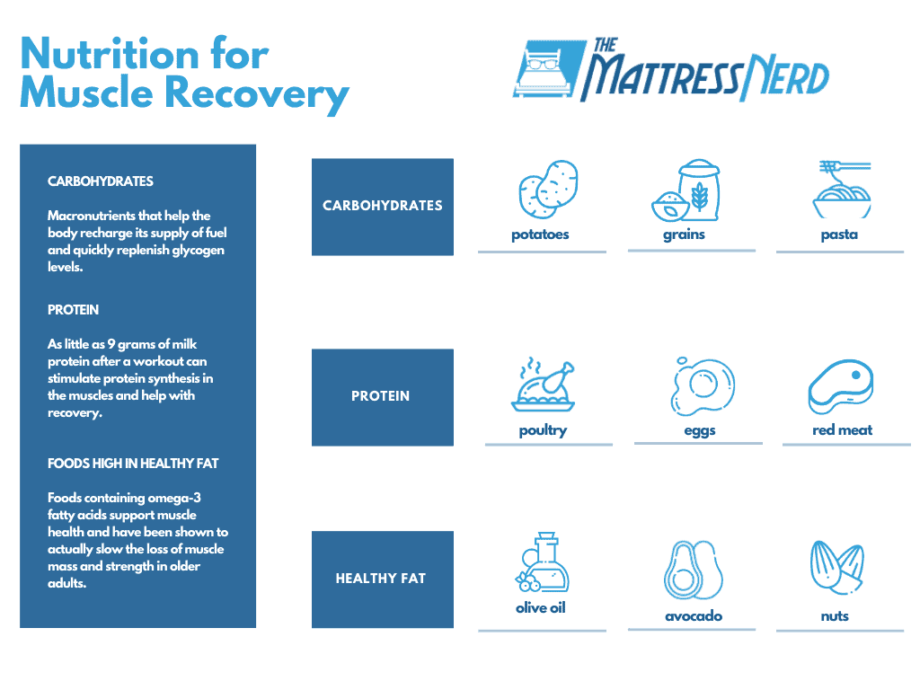
For optimal sleep, consider these nutrition tips before bedtime:
- Choose nighttime snacks wisely: Researchers have found that certain foods containing tryptophan or melatonin can help you fall asleep. These include bananas, yogurt, milk, rice, grapefruit, kiwis, oats, turkey, cherries, walnuts, and almonds.
- Cut back on carbohydrates before bedtime: Consuming carbs-rich foods immediately before bedtime may impair growth hormone secretions during deep sleep.
- Cut out afternoon and evening caffeine: Caffeine can be effective in improving mental and physical performance. But caffeine can also impair sleep, sometimes without you knowing it. Try to avoid caffeinated foods or beverages at least six hours before bedtime.
- Just say no to energy drinks: Energy drinks are often marketed for enhanced sports performance. But, these drinks can contain elevated levels of caffeine and other substances that can result in overstimulation. This over-aroused state can actually cause athletes to see a decline in performance. Plus, overconsumption of energy drinks has been linked to serious adverse effects including, strokes, seizures, and death.
- Cut out sugar: Eliminating sugar after dinner helps you fall asleep. That’s because sugar raises your blood sugar, which triggers your pancreas to release insulin; this fuels your cells and can overstimulate you. Hence, the “sugar high” often experienced after a sugary snack or beverage.
Summary
Research has shown that regular and adequate sleep helps repair and restore muscles, increases muscle strength and mass, and improves athletes’ performance. With so many benefits, sleep should be a part of every athlete’s and exercise enthusiast’s workout regimen.
